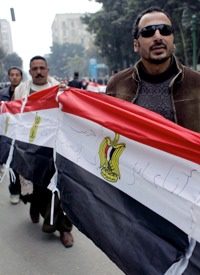
Several top U.S. officials have been to Egypt recently in a failed bid to secure the release of the suspects. And this week, a group of U.S. Senators including John McCain (R-Ariz.) arrived in Cairo to keep the pressure up, even as bilateral relations between the two governments have sunk to their lowest point in decades.
The defendants include more than 40 people working for groups that receive U.S. government funding: The International Republican Institute (IRI), the National Democratic Institute (NDI), the International Center for Journalists (ICFJ), and Freedom House. Employees of the Konrad Adenauer Foundation — financed by German taxpayers — are also in the crosshairs.
The suspect who has attracted the most media attention so far is Sam LaHood, chief of the IRI’s Egyptian branch and the son of U.S. Transportation Secretary Ray LaHood. He reportedly took refuge at the American embassy in Cairo as the “transitional” rulers began to crack down on foreign-funded NGOs late last year and raided offices and issued travel bans against suspects in a criminal investigation.
According to the state-run MENA news agency, the defendants are being charged with establishing chapters of foreign organizations in Egypt without a license and accepting foreign funding in violation of Egyptian sovereignty. Over the weekend, a state-owned newspaper reported that the organizations were also unlawfully seeking to interfere in the political process “in a way that serves the interests of the funders.”
One of the key players driving the prosecutions is Egyptian Minister of Planning and International Cooperation Aboul Naga, a holdover from the former regime. According to reports published by government media outlets, Naga said the foreign tax-funded groups were stoking chaos for strategic geopolitical purposes.
“Evidence indicates an unequivocal desire and persistence to thwart any attempt at Egypt’s progress as a modern democratic country with a strong economy since that will pose a threat to Israel and American interests,” Naga was quoted as saying in official testimony. “The United States and Israel could not create a state of chaos and work to maintain it in Egypt directly, so they used direct funding to organizations, especially American, as a means of implementing these goals.”
If convicted, the suspects could face up to five years in prison and hefty fines, according to news reports.
But while the regime is essentially accusing the suspects of subversion and agitation on behalf of Western powers, most of the groups involved have said they were simply promoting “democracy” — not getting involved in politics or encouraging anyone to protest. The ICFJ said in a statement that its only interest was encouraging good journalism.
Some analysts and U.S. officials have characterized the investigations and prosecutions as a bid by Egypt’s new rulers to deflect criticism and distract the public as opposition to the new regime escalates. Activists also claimed the crackdown was aimed at silencing dissent.
“We hear it said that these NGOs are violating Egyptian sovereignty and meddling in this country’s internal affairs,” Sen. McCain told reporters as he sought to get the suspects released. “Nothing could be further from the truth.”
According to McCain, who arrived in Cairo on Monday with Sen. Joe Lieberman and Sen. Lindsey Graham, the tax-funded groups were doing nothing wrong. “Their work — which is done at the request of Egyptian democracy and civil society groups — seeks to support these Egyptian partners in pushing for the rule of law, free elections, a free media, respect for the human rights of all people, and other core principles of a democratic society,” he claimed.
The prosecutions have led to a sharp rise in tensions between the U.S. and Egyptian governments. Lawmakers on both sides of the aisle and the Obama administration have called on the military rulers in Cairo to release the suspects, while Egyptian authorities slammed the foreign interference in domestic affairs. The strain in relations is expected to increase further in the coming days.
Earlier this month, Secretary of State Hillary Clinton and other senior administration officials were ramping up the rhetoric as it became clear that the tax-funded American groups were in serious trouble. Egyptian authorities responded by saying that they would like to stop the prosecutions but were powerless to do so.
“We are doing our best to contain this,” said Egyptian Foreign Minister Mohamed Kamel Amr after meeting with Clinton in Germany. “But we cannot actually exercise any influence on the investigating judges right now when it comes to the investigation.”
The U.S. government is now threatening to cut off almost $1.5 billion in taxpayer-funded aid to Egypt if it does not back down — money that had been flowing to ousted strongman Hosni Mubarak before he was overthrown more than a year ago. Egyptian officials, meanwhile, have desperately sought to keep the funds flowing, even sending a delegation to Washington in an effort to resolve the impasse.
The unconstitutional U.S. foreign aid, mostly military, was primarily justified by American officials to ensure that the Egyptian dictatorship obeyed a peace treaty with neighboring Israel. But now, with the surge to power of radical Islamists in recent parliamentary elections, even the agreement with the Israeli government is in question — raising the prospect that U.S. weapons and tax dollars doled out over more than two decades could one day be turned against the Jewish state.
The trials are set to begin on Sunday at the North Cairo Criminal Court. It remains unclear whether the defendants plan to show up, but a legal expert quoted by the Associated Press said that allowing the cases to proceed in court could offer Egyptian authorities a way to defuse tensions while letting all parties save face.
Related articles:
Egyptian Government May Prosecute Foreign Activists
Egypt’s Relations With U.S. Strained as Military, Islamists Reign
Organized Chaos: Behind the Scenes in the Middle East
Egypt Islamists Win Big in Election, Sparking Fears
State Dept. Seeks “Special Fund” for Arab Spring
Egypt Revolt Leading to Military Dictatorship



